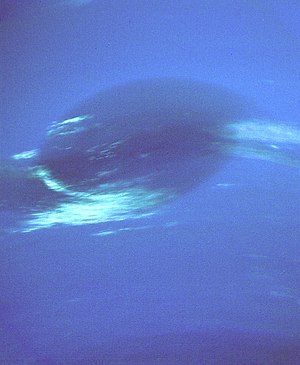
The Great Dark Spot (also known as GDS-89, for Great Dark Spot, 1989) was one of a series of dark spots on Neptune similar in appearance to Jupiter's Great Red Spot. In 1989, GDS-89 was the first Great Dark Spot on Neptune to be observed by NASA's Voyager 2 space probe. Like Jupiter's spot, the Great Dark Spots are anticyclonic storms. However, their interiors are relatively cloud-free, and unlike Jupiter's spot, which has lasted for hundreds of years, their lifetimes appear to be shorter, forming and dissipating once every few years or so. Based on observations taken with Voyager 2 and since then with the Hubble Space Telescope, Neptune appears to spend somewhat more than half its time with a Great Dark Spot. Little is known about the origins, movement, and disappearance of the dark spots observed on the planet since 1989.